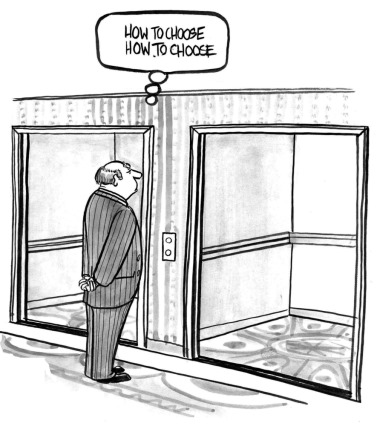Making decisions that don’t matter that much to me
Posted: - Modified: | decisionI minimize the number of decisions I care about. What I’m going to do with my life? Big decision worth spending time on. Is something worth it? I can spend hours analyzing the trade-offs. What do I want to eat? I don’t particularly care. I’m trying to avoid decision fatigue. Decisions take up time and willpower. Also, I’m trying to minimize attachment. Everything’s going to be okay.
W- asked me what colour I would like the deck to be. I looked at the dozens of swatches all neatly laid out, and I boggled at him. It’s like when people ask me where I want to eat. Beats me. At least there, I can use a rule of thumb: closest $-$$ place rated at least 3.5 stars on Yelp that’s still open at this time of day and that satisfies everyone’s dietary restrictions.
 If I don’t care about the outcome of a decision – if multiple alternatives are not significantly different in terms of their value to me – I’ll tell people I don’t care strongly enough to decide. That way, they don’t mistake a casual opinion for a strongly-held opinion and end up regretting being overruled. If people really want me to participate, I’ll support whatever people suggest, and I’ll help people remember their reasons for or against something. I’ll also ask questions to draw out reasons and make off-the-wall suggestions to add humour.
If I don’t care about the outcome of a decision – if multiple alternatives are not significantly different in terms of their value to me – I’ll tell people I don’t care strongly enough to decide. That way, they don’t mistake a casual opinion for a strongly-held opinion and end up regretting being overruled. If people really want me to participate, I’ll support whatever people suggest, and I’ll help people remember their reasons for or against something. I’ll also ask questions to draw out reasons and make off-the-wall suggestions to add humour.
This is probably not quite what people are looking for. Usually, when people ask for your opinion on something, it’s because they want it.
My default is to not have an opinion. Maybe I should. It’s pretty easy to pick something and then let your brain fill in the reasons for it. People learn more about their choices in the negotiation.
Or maybe I should just have a more structured approach when people ask me about things I don’t have an opinion about. List alternatives, costs, benefits; make diagrams; graph arguments. That way, even if I don’t have an opinion, I can contribute value.
We discussed a few stain options. W- picked one and painted the deck with it. He thought it looked too gray in the sunlight. He stripped it back down and started looking for a different colour. (While I’m easily distracted from finishing my tasks and a big fan of getting things 80% okay, W- is awesome at persistence, and is working on getting around the sunk costs fallacy.)
I don’t mind. It gives me more opportunities to be supportive of projects and experiments, even though I am probably not yet filling the more useful role of the Voice of Reason. I think being able to use the Voice of Reason needs experience anyway. (They say good decisions come from experience, and experience comes from bad decisions. Not that this was a bad decision; it’s just a different outcome.)
I’m going to be asked for my opinion of or recommendation for many many things in life, especially as I move into my thirties. People assume twenty-somethings don’t know very much, except maybe about tech. Thirty-somethings probably don’t know much either, but are expected to have Opinions. Might as well learn.
How do you handle being asked for your opinion when you haven’t given something much thought?

8 comments
gwenhael_le
2013-12-06T13:25:59ZI often choose randomly in those cases, to the point of illustrating it with a child's riddle if the environment isn't too formal (am stram gram, pick et pick et colegram, bourre et bourre et ratatam, am, stram, gram.)
I realized that in those cases I don't really care about the outcome not caring from the start makes it even easier to accept what you have chosen in the end.
sachac
2013-12-08T10:24:01ZI'm learning to limit the things I concern myself with so that I can focus on making those things awesome. =) Everything else - why worry?
chasrmartin
2013-12-07T01:44:25ZRemember, if the choice doesn't matter, it doesn't matter what you choose.
sachac
2013-12-08T10:23:32ZAnd of course there's what the Cheshire cat told Alice when she asked which way she ought to go. =)
chasrmartin
2013-12-09T00:42:47ZSmart kitty.
chasrmartin
2013-12-09T00:44:16ZBut seriously, it really reduced my general agita considerably when I realized that if I didn't see an advantage to choice _i_ of _n_ possibles, then maybe it didn't matter which one I chose.
Raghav
2013-12-07T18:04:45Z"I don't believe in taking right decisions. I take decisions and then make them right"- Ratan TaTa
amitp
2014-04-15T17:02:16ZIf there's a clear preference then the choice is easy; make it. If there's not a clear preference then the choice is hard. But it's exactly when the choice is hard that the options are worth about the same to you. So that's when it matters the least.
Related: http://en.wikipedia.org/wik...
As for your question: if someone is asking me advice on a decision, and I haven't thought about that specific decision, I'll usually give advice on how I'd approach that type of decision in general, including bringing up the question of "how much does it matter to you?"